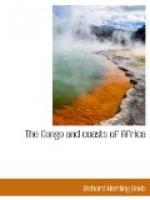In the moonlight the natives with their camp-fires and torches made most wonderful pictures. Sometimes for their sleeping place the captain would select a glade in the jungle, or where a stream had cut a little opening in the forest, or a sandy island, with tall rushes on either side and the hot African moon shining on the white sand and turning the palms to silver, or they would pitch camp in a buffalo wallow, where the grass and mud had been trampled into a clay floor by the hoofs of hundreds of wild animals. But the fact that they were to sleep where at sunrise and at sunset came buffaloes, elephants, and panthers, disturbed the women not at all, and as they bent, laughing, over the iron pots, the firelight shone on their bare shoulders and was reflected from their white teeth and rolling eyes and brazen bangles.
Until late in the night the goats would bleat, babies cry, and the “boys” and “mammies” talked, sang, quarrelled, beat tom-toms, and squeezed mournful groans out of the accordion of civilization. One would have thought we had anchored off a busy village rather than at a place where, before that night, the inhabitants had been only the beasts of the jungle and the river.
IV
AMERICANS IN THE CONGO
In trying to sum up what I found in the Congo Free State, I think what one fails to find there is of the greatest significance. To tell what the place is like, you must tell what it lacks. One must write of the Congo always in the negative. It is as though you asked: “What sort of a house is this one Jones has built?” and were answered: “Well, it hasn’t any roof, and it hasn’t any cellar, and it has no windows, floors, or chimneys. It’s that kind of a house.”
When first I arrived in the Congo the time I could spend there seemed hopelessly inadequate. After I’d been there a month, it seemed to me that in a very few days any one could obtain a painfully correct idea of the place, and of the way it is administered. If an orchestra starts on an piece of music with all the instruments out of tune, it need not play through the entire number for you to know that the instruments are out of tune.
The charges brought against Leopold II, as King of the Congo, are three:
(a) That he has made slaves of the twenty million blacks he promised to protect.
(b) That, in spite of his promise to keep the Congo open to trade, he has closed it to all nations.
(c) That the revenues of the country and all of its trade he has retained for himself.
Any one who visits the Congo and remains only two weeks will be convinced that of these charges Leopold is guilty. In that time he will not see atrocities, but he will see that the natives are slaves, that no foreigner can trade with them, that in the interest of Leopold alone the country is milked.




